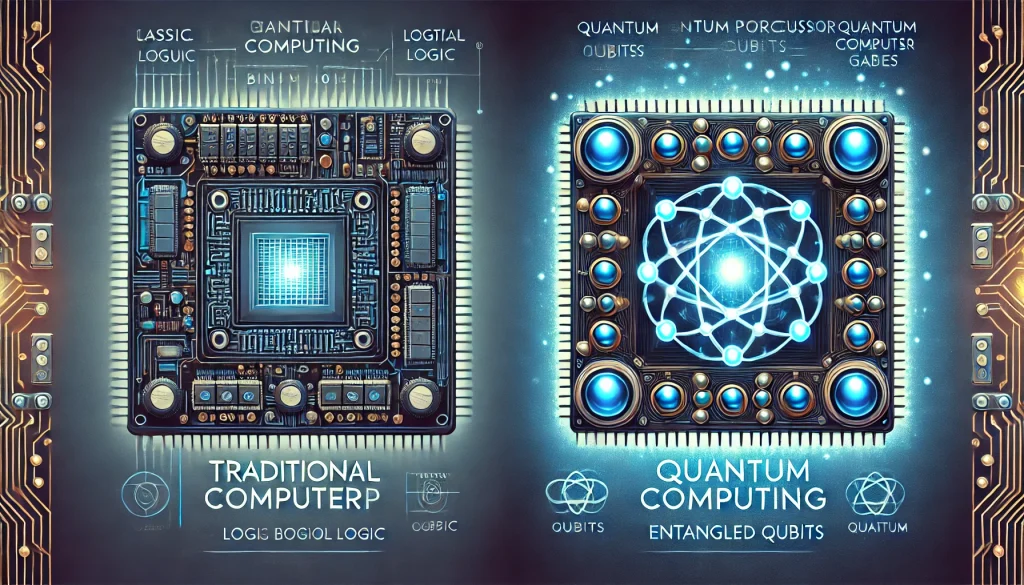
Overview
In the world of technology, the ongoing comparison between quantum computing and classical computing continues to be a hot topic. With advancements happening faster than ever before, both systems present distinct advantages and challenges. October 2024 marks another milestone for these two competing models, especially as quantum computing becomes more integrated into industries such as artificial intelligence (AI) and cybersecurity. But what sets quantum computing apart from classical computing, and what does the future hold for both systems? Let’s dive into the details.
At the core, the debate between quantum computing and classical computing revolves around how each system processes and utilizes data. While classical computers use binary bits (0s and 1s) to represent information, quantum computers employ qubits, which can exist in multiple states simultaneously. This unique characteristic gives quantum computing the potential to solve complex problems exponentially faster than classical computing, making it highly relevant for solving challenges that traditional computers struggle with.
Quantum computing is particularly gaining traction as industries like AI, financial modeling, and IBM research push its boundaries further. However, it’s important to note that classical computing still dominates everyday tasks due to its reliability and widespread applications. This blog will explore the growing impact of quantum computing while analyzing its role in comparison with classical computing.
Recent Breakthroughs in Quantum Computing
October 2024 has seen significant breakthroughs in the quantum computing space. One of the key developments comes from IBM and Google, both racing to build a commercially viable quantum computer. IBM recently announced that their latest quantum processor can perform calculations that would take classical computers thousands of years. This development is revolutionary, especially for fields like cryptography, where complex encryption can now be cracked in a matter of minutes.
These breakthroughs in quantum computing are becoming more frequent, with more firms investing in the technology. Recently, a new quantum communication protocol was developed, enhancing security measures in networks. This could reshape industries that rely heavily on secure data transmission, such as healthcare and financial sectors.
Emerging Applications of Quantum Computing

With such rapid progress, quantum computing is finding its way into multiple industries. Artificial intelligence (AI) is perhaps one of the most promising areas where quantum computing has a significant impact. Quantum AI algorithms can solve problems more efficiently than classical methods, enabling faster data analysis, improved machine learning models, and accurate predictions in fields such as medicine and climate science.
Moreover, quantum computing has been adopted for logistics optimization. Quantum algorithms help companies reduce shipping times and energy usage by optimizing routes, making supply chains more sustainable and cost-efficient. As the technology matures, we can expect a further rise in quantum computing applications, particularly in industries requiring complex simulations and models.
Integration with Other Technologies
The integration of quantum computing with other emerging technologies is where the real magic begins. For instance, blockchain technology could be significantly enhanced with quantum systems, ensuring faster transaction times and better security measures. Moreover, the synergy between quantum computing and artificial intelligence (AI) has the potential to accelerate advancements in deep learning and neural networks, allowing businesses to make faster decisions based on real-time data.
In recent months, research institutions have also experimented with integrating quantum computers into cloud computing infrastructures. This hybrid approach would allow companies to tap into quantum power without requiring expensive, specialized hardware on-site. Companies like Amazon Web Services (AWS) and IBM have already begun offering quantum computing as part of their cloud services, making the technology more accessible to businesses worldwide.
Improvement in User Experience

Despite the theoretical advantages of quantum computing, it is still in its early stages when it comes to user experience. However, significant strides have been made to improve quantum computing’s usability. In October 2024, new developer tools were introduced to make programming for quantum systems easier. IBM’s Qiskit framework is a key example of how the quantum computing landscape is becoming more accessible. These tools allow developers without a background in quantum physics to write quantum programs in Python, bringing this technology closer to mainstream use.
Moreover, quantum computing hardware is becoming more user-friendly. Early versions of quantum processors were prone to errors due to qubit instability, but IBM’s latest quantum chips have shown significant improvement in stability and accuracy. With enhanced performance and easier-to-use platforms, businesses can expect more user-friendly quantum computing systems in the near future.
Challenges in Quantum Computing
Despite the growing hype, quantum computing still faces major challenges that prevent it from overtaking classical computing anytime soon. One of the main obstacles is decoherence—the process by which quantum states lose their stability due to environmental interference. This instability results in errors during calculations, which makes it difficult to achieve consistent results.
Furthermore, the current quantum processors are still far from being as reliable as classical processors. Quantum systems are highly sensitive to even the slightest disturbances, such as temperature fluctuations or electromagnetic noise. Building error-correcting mechanisms that work at scale remains a formidable challenge.
Another hurdle lies in the accessibility of quantum computing. While cloud-based solutions have made some progress, many businesses still find the cost of quantum computing hardware prohibitive. Until the technology becomes more affordable, classical computing will remain the go-to solution for most industries.
Conclusion
As October 2024 draws to a close, it’s clear that quantum computing is transforming industries and technologies faster than ever before. From recent breakthroughs in IBM’s quantum processors to the growing integration of quantum systems in AI and cloud computing, the future of computing is undeniably bright. However, quantum computing still has challenges to overcome—such as decoherence and affordability—before it can fully replace classical computing.
That said, businesses and researchers alike are recognizing the transformative power of quantum technology. While classical computing continues to dominate, the race to harness the potential of quantum computing is only heating up. As we move forward, staying informed about these trends will be crucial for those interested in the future of computing.
Now is the perfect time to explore how quantum technology can benefit industries. It’s also a great time for developers to dive into the world of quantum programming with user-friendly tools. The field is evolving fast, and the potential applications of quantum computing are just beginning to reveal themselves.
FAQ
What is the main difference between quantum and classical computing?
Classical computers use binary bits, while quantum computers use qubits, which can exist in multiple states simultaneously. This makes quantum computing faster for certain tasks.
Can quantum computers replace classical computers?
Not yet. Quantum computers are still in the experimental stage and face issues like decoherence, but they show potential for solving complex problems faster than classical systems.
What industries can benefit most from quantum computing?
Industries like AI, cryptography, finance, and logistics are expected to benefit significantly from the advancements in quantum computing.
Resources
- Kevin Tatem. Quantum Computers vs Classical
- Quantropi. Quantum Versus Classical Computing
- TechTarget. Classical vs Quantum Computing
- The IoT Academy. Classical Computing vs. Quantum Computing
- Times Microwave. The Difference Between Classical and Quantum Computing
